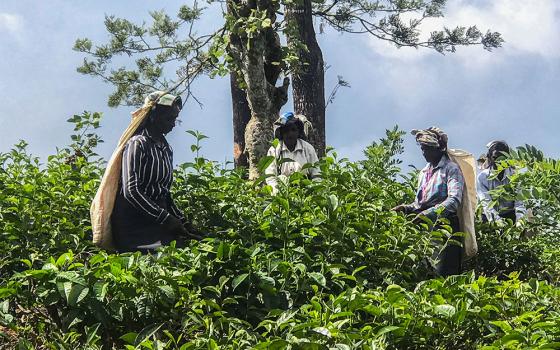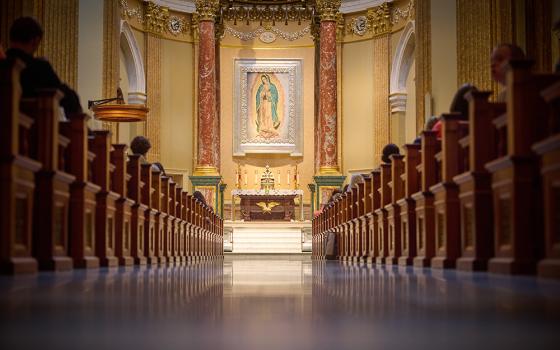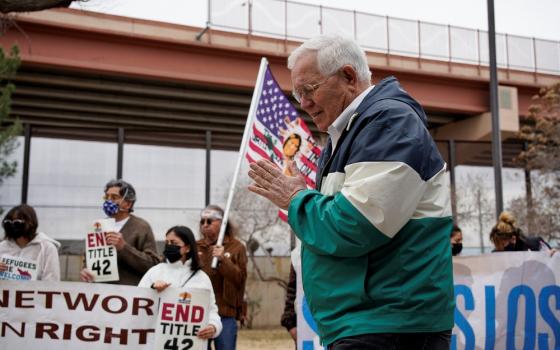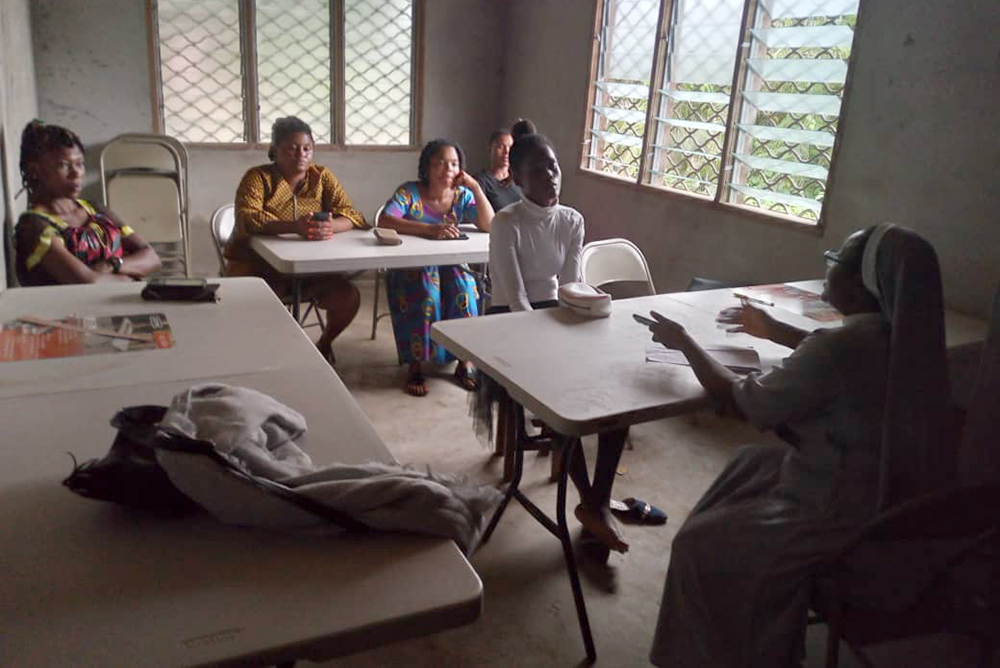
Sr. Rosemary Arrah ministers to teenage mothers who have succeeded writing their General Certificate of Education Examinations on Aug. 10, 2023. (Rosemary Arrah)
Educating teenage girls in school has been a challenging experience due to the changes in our socio-cultural backgrounds. In Cameroon, it is even more challenging to educate teenage mothers or pregnant girls.
I have worked with teenagers for more than 25 years, and the experience is increasingly getting tougher. Girls now have divided minds and think they can juggle school life and social life, and before they know it, they are struggling to be students and mothers at the same time. It is becoming a high risk to educate girls due to the increasing difficulty faced by parents and sponsors of girls who do not complete high school due to teenage pregnancy. The prevalence is increasing, and the number of teenage girls writing the General Certificate Examination with pregnancy has also increased since 2016 and the COVID-19 closure of schools in 2020.
Girls were more ashamed to be seen pregnant and going to school, but now, it is not a big deal for some teenage girls. I have worked with many teenage girls between the ages of 15 and 20 who have either dropped out of school due to pregnancy, going to school while pregnant or writing the GCE while pregnant or teen mothers.
Advertisement
The problem with teenage pregnancy and teenage motherhood, especially in the northwest and southwest regions, has become more rampant due to the socio-political crisis since 2016. I have seen more teenage girls pregnant or mothers than in the past. Two years ago, I worked with over 40 pregnant women in Okoyong village as an outreach program for our social services in the Manyu division, and more than half were students from about six secondary schools in Manyu. In most of my conversations with teenage girls, I found that parental neglect, poverty and low self-esteem got them entangled with boys or men, and without self-awareness and limited education, they became pregnant. Some did not know they were pregnant until told or asked and were taken to the hospital to confirm their pregnancy.
Parental neglect does not only end with pregnancy; it continues after the teenage girls give birth. For some who have managed to go to school, their education is interrupted, and the girls drop out or are forced to stay with the boy or man who fathered their child without legal marriage, sometimes for years or even life. Most of the girls who drop out of school due to pregnancy continue to live in poverty. Some are forced into marriage as second or third wives because the parents refuse to take responsibility for the girl and her child.
In the places where I have worked, women with children bear the majority of responsibility in their homes. Often, the children are not cared for, and the women lack their basic needs and that of their children, with little support from the fathers. Most children from these homes go to school without basic school supplies, and often, their school fees are not paid. Teenage pregnancy and motherhood eventually leads to a cycle of poverty and problems in the family and society.
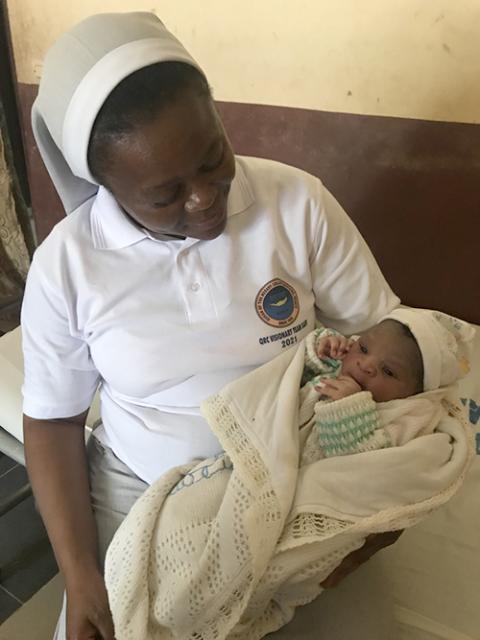
Sr. Rosemary Arrah holds the baby of a teenage mother in October 2022. (Rosemary Arrah)
Recently, I spoke to a few girls from Okoyong village who dropped out of school due to teenage pregnancy. I asked how they were and how they were doing with their babies? They shared with me that the worst thing that happened to them was getting pregnant while in school. Apart from the trauma and shame of becoming pregnant while still in school, they had to deal with the pain of rejection and neglect from their parents and the men who fathered their children. Life was even more miserable for the girls than they had imagined.
Very few girls in the villages are lucky enough to have parents or sponsors who agree to allow them to continue their education after the child is born. Even if they have someone to pay their fees, there is the challenge of finding someone to take care of their child while they continue school.
As a principal for the past 10 years, I have worked with more than 80 teenage girls in the villages where I have served, who became pregnant while in school, especially during the Christmas holidays and third term holidays. The most challenging experience is to work with the parents of the girls to encourage them to send them back to school after they give birth. Some girls give up, especially those in examination classes who write and fail the public exams. The most difficult part is helping the girls deal with the psychological and social repercussions. Many are torn between their roles as mother and student and sometimes are unable to find the balance between school and motherhood.
I have supported some students in going back to school, but often they lack the motivation to stay in school due to societal abuse and insults directed at pregnant teenage girls and teen mothers. Some of this verbal abuse comes from their peers and close friends. The most painful experience for the girls is the verbal abuse from teachers and adults around them. Some girls are seriously determined to overcome the shame, and focus on school in order to transform their lives, but they need a lot of support to thrive.
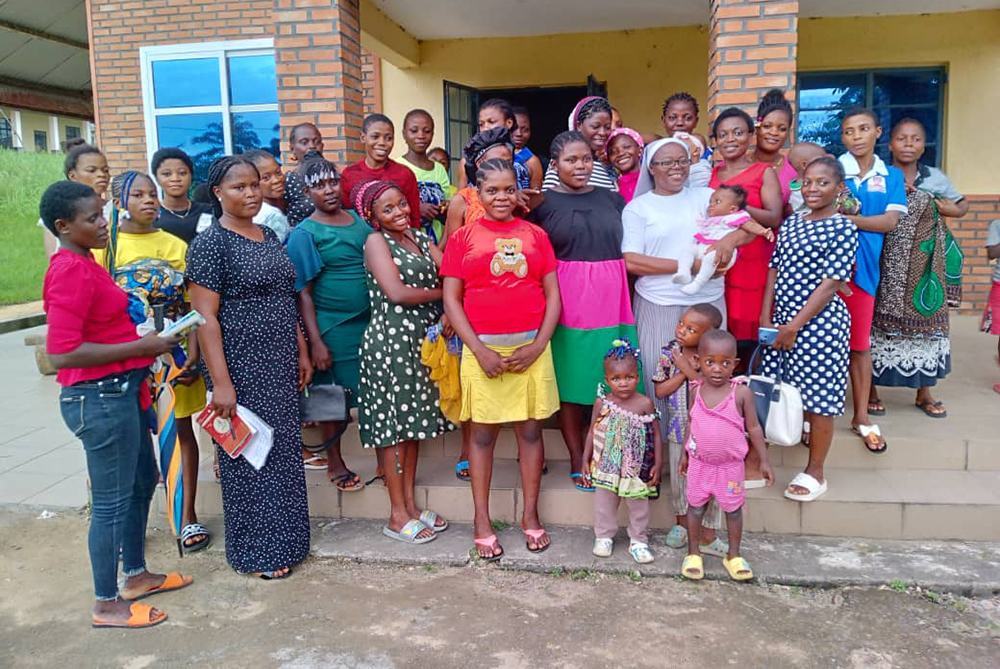
Sr. Rosemary Arrah holds a baby while posing for a picture with teenage mothers during one of the sessions at the Handmaids Education and Social Services Cameroon on Aug. 10, 2023. (Rosemary Arrah)
Teenage pregnant girls and teen mothers can be empowered to stay in school and complete their education. The government, schools, NGOs, churches, religious congregations, parents and all who are interested in the education of young girls can figure out ways to collaborate to support them in school with both material and non-material support to enable them to study and graduate from high school.
While the government passes laws for pregnant girls to remain in school, it is necessary to implement programs needed for them to succeed in school. Some of these programs could be opening childcare centers in towns to help support the girls to continue their education. These centers would offer programs for holistic sex education, self-care and management after the first pregnancy, in addition to help from parents or sponsors on how to manage their lives in order not to be victims of teenage pregnancy again.
I have taken action to support these girls by bringing them together three times a year to monitor their progress, mentor and empower them to stay in school and obtain a certificate for either higher learning or vocational training. The most challenging part of this initiative is the lack of financial support to assist them with basic needs, school supplies, fees, rent and transportation. To address this, I established a program called Handmaids Education and Social Services Cameroon aimed to provide mentorship to help these girls thrive. They require prayer, support, encouragement and empowerment to break the cycle of early pregnancy and school dropout. I pray I can find people interested in supporting the girls through this program.
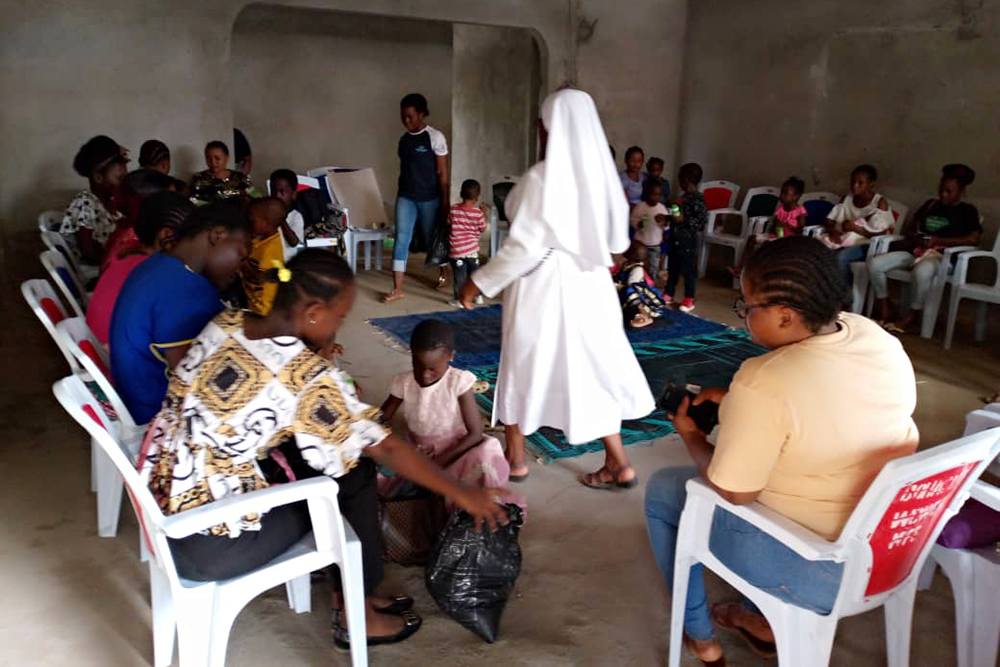
Sr. Rosemary Arrah celebrates foundress day with teenage mothers on Feb. 27, 2023, at Mamfe, a town in the southwest region of Cameroon. (Rosemary Arrah)
It has been emotionally draining to hear countless stories of teen mothers or pregnant girls over the years. As a religious, I feel that responding to the needs of these girls aligns with the mission of my foundress Mother Mary Charles Magdalen Walker, Servant of God, and serves Christ in the poor and vulnerable girls. As an educator, addressing these needs is a crucial step towards ending the cycle of abuse and gender-based violence in schools, communities and society.
Last year, I supported 23 teen mothers as they prepared for public exams, and 21 of them passed. Out of those 21, 10 teen mothers were inspired to pursue further education in professional schools. This success motivates me to reach out to more teen mothers and empower them through education.
Each girl's life is valuable, and making a difference in even one life is a beautiful act of service to God.


